I’ve long admired this image of Henry Allen Rucker. It is part of the W.E.B. DuBois collection that was exhibited at the Paris Exhibition in 1900. Many of the photos were taken in Atlanta, so I thought it was time to dig a little behind this particular image.
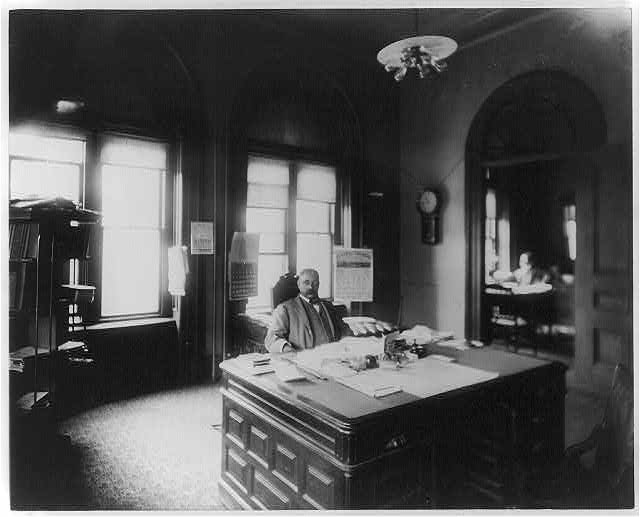
I was surprised to find a Douglas County connection, which is one of my primary areas of research.
Henry Allen Rucker was a man who lived two lives. The first as a slave, and the second as a successful businessman who shook the hand of a president and ended up being the first and only African American to be appointed to the office of collector of Internal Revenue in Georgia.
Rucker was born a slave in Washington, Georgia on November 14, 1852 to Edward Rucker and Betsey Golden. The Ruckers were enslaved by the King family of Athens, Georgia who were the in-laws of Henry W. Grady.
Following the Civil War, Rucker moved to Atlanta with his family.
He attended the first school for freedmen taught by Northern teachers in Atlanta. It was held at the AME church building on Armstrong Street which was actually Jenkins Street back in Rucker’s day. The school would become known as the Storrs School, the forerunner of Atlanta University.
Rucker married Annie Eunice Long in 1886. She was the daughter of Jefferson Franklin Long of Macon, the only African American elected to represent Georgia in the United States Congress during Reconstruction. The Ruckers would have eight children. Their daughter, Lucy married Atlanta architect and engineer Walter Henry “Chief” Aiken in 1920. He was involved in such projects as the women’s dorm at Morris Brown College, West Lake Court Apartments, and the Waluhaje Hotel and Apartments. The Aikens were heavily involved in Atlanta’s Civil Rights movement.
Charles Allen Rucker first supported his family by opening a barber shop on Decatur Street. Later, he attended Atlanta University and would eventually become involved in the Niagara Movement, the NAACP, and the Republican Party.
He was a clerk with the Internal Revenue Collections office in Atlanta from 1880 to 1885 and 1889 to 1893. At some point he was let go.
In 1887, he purchased a home on Piedmont Avenue.
Henry Allen Rucker first met William McKinley in August, 1888 when the future president was referred to as Senator McKinley. The two met at Salt Springs (today’s Lithia Springs) when Rucker shook McKinley’s hand following his address regarding the tariff at the Piedmont Chautauqua.
At that time it is said Rucker commented to McKinley, “Major [referring to McKinley’s rank in the Union army], I hope I may have the pleasure of shaking your hand when you are President of the United States.”
Rucker met up again with McKinley in 1895 at a reception. When someone in the group mentioned McKinley could never carry the state of Georgia in a presidential election Rucker said to McKinley, “Governor, pay no attention to that fellow, you shall have Georgia.”
Rucker was a delegate to the St. Louis Convention and introduced a resolution condemning lynching and mob violence, which became a plank in the Republican platform upon which President McKinley was elected.
In 1897, President McKinley named Rucker as Collector for the District of Georgia, “and on the eve of the 5th day of August, 1897 had the pleasure of succeeding the man, who, four years before had relieved him from the clerkship of the same office” per Kletzing in his book The Remarkable Advancement of the American Negro.
Rucker served in that capacity from 1896 to 1910.
In 1890, he helped to form Georgia Real Estate and Trust Company, one of two black financial institutions in Atlanta at the time.
In 1904, he built the Rucker Building at 158-160 Auburn Avenue. The three-story structure was the first black owned office space situated at the corner of Auburn and Piedmont Avenues. It was red brick with retail space on the first floor and professional office space on the second and third floors filled with doctors, dentists, fraternal organizations and the Republican Party once had an office there.
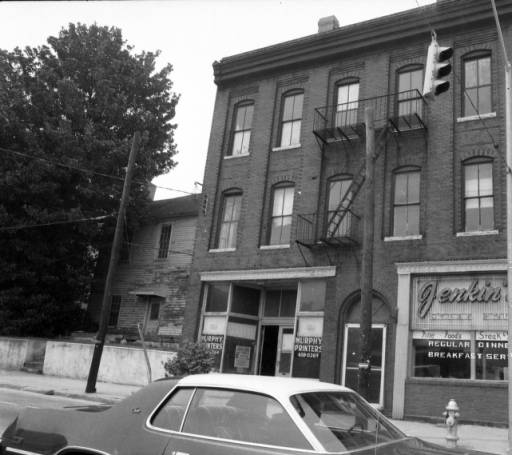
Unfortunately, the historic building had to be demolished in 2001. This time it wasn’t Atlanta’s penchant for demolishing historic and vintage structures. A vehicle was the culprit. A driver lost control and hit the building in the right spot or in this case the wrong spot compromising the front support column. Add broken water pipes into the mix and the historic building was severely weakened and could not be saved.
Henry Allen Rucker died in 1924 and is interred with other family members at Atlanta’s historic Oakland Cemetery.
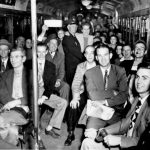

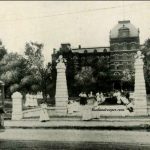
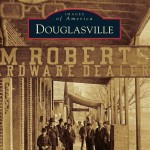
Hello Lisa –
As the owners of what is unfortunately now a vacant lot, the Historic District Development Corporation appreciates your research on this important Atlantan and the former Rucker building.